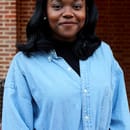World stop.
Beyoncé has everyone shook—yet again. This time, it’s with her newly-released documentary, Homecoming, which provides an up-close look at her iconic 2018 Coachella performance. The documentary features quality footage of the HBCU-inspired performances from both weeks of the festival, insight from Beyoncé about her extensive preparation for the show, and cameo appearances by Jay-Z, Kelly Rowland, Michelle Williams, and Solange. To top it off, Bey surprised us with Homecoming: The Live Album, a 40-song audio compilation of the show from “Crazy in Love” to “Before I Let Go” (Yes, she remixed it! What can’t she do?)
In case you haven’t yet realized how major, this Coachella—more suitably known as Beychella—documentary is, here’s a breakdown.
Beyoncé gave us a production. A Black production.
This performance was an unapologetic tribute to HBCUs and Black culture as a whole. Elements of HBCU life and Black culture are weaved effortlessly throughout the show. After performing “Freedom” in the first few minutes of the show, she transitions to “Lift Every Voice and Sing” otherwise known as the “Black National Anthem.” The selection and placement of these songs was not coincidental.
Following “Formation,” we hear an audio clip of Nina Simone, saying, “To me, we are the most beautiful creatures in the whole world, Black people.” Bey goes on to describe her lifelong wish to attend an HBCU—a wish that was robbed by her premature exposure to fame. Since she couldn’t live out her HBCU dream in reality, she lived it through her Beychella performance. She even incorporated the well-known HBCU anthem, “Swag Surf” into “Drunk in Love.”
The amount of creativity, precision, and dedication it takes to pull off a performance dedicated to HBCUs is unheard of. Black culture is not one to be played with, so its tribute has little room for mistakes. If you’re going to represent the HBCU experience, you’ve got to come correct; and Bey did just that.
The production consisted of a drumline marching band, an all-Black orchestra, and steppers, who embodied the Divine Nine culture that is so precious to Black people worldwide. She brought Blackness to a predominantly white festival.
“When I decided to do Coachella,” Bey says, “instead of me pulling out my flower crown, it was more important that I brought our culture to Coachella.”
She raised the bar for Black women.
Since her self-titled visual album, Beyoncé has embraced her inner-feminist. The hit single “Flawless” was the most brazen glance at feminism from Bey’s perspective. The song even features a snippet from world-renowned feminist, Chimamanda Ngozi Adichie’s TED Talk, saying, “We teach girls to shrink themselves, to make themselves smaller. We say to girls ‘You can have ambition, but not too much. You should aim to be successful, but not too successful; otherwise, you will threaten the man.’” In “Flawless,” Bey also sings about how she’s not “just his little wife.” She is a Black woman, and that is her power.
Beyoncé used Coachella as another platform for women empowerment. In the middle of her performance of “Sorry,” she addresses the women in the audience, saying, “Ladies, are we smart? Are we strong?” She seamlessly transitions into “Me, Myself, and I,” a classic women’s empowerment anthem about independence and strength. Fitting enough, she introduces “Flawless,” next, saying “This next song is for all of my queens.”
But even Queens can be vulnerable.
It’s rare that we catch a glimpse of Beyoncé’s personal life; but when we do, every glimpse she allows us to see is intentional. Meaningful.
Beyoncé explains how her unexpected pregnancy prevented her from performing in Coachella’s 2017 festival. Showing clips of her during and post-pregnancy, she describes her troubling pregnancy with her twins, Sir and Rumi. “I had high blood pressure. I developed toxemia, preeclampsia, and in the womb, one of my babies’ heartbeat paused a few times, so I had to get an emergency C-section,” Bey says. When it was time to prepare for Beychella, she had to come ten times harder, fighting through insecurities about her body along the way. “It’s your own personality that brings [the choreography] to life,” Beyoncé says, “And that’s hard when you don’t feel like yourself.” While rebuilding her body physically, she had to rebuild her confidence.
Yes, you read it right. Even Beyoncé doesn’t feel like herself sometimes.
This intimate look at Bey’s struggles with her health, confidence, and body-image allows women all over the world to identify with her. Every woman goes through these struggles in some shape or form, but the message in the documentary is about growth. If Beyoncé can grow through adversity, so can any woman, and Bey made sure we realized that through this film.
She put in the work.
How many artists do you know rehearse eight months straight for a two-hour performance after giving birth to twins?
For four months, Bey held rehearsals solely for the band and vocal aspects of the show. She refers to the vocals and music as “the heartbeat of the show,” explaining how she wants the performance to exude the same energy as authentic HBCU bands. Following the “heartbeat” rehearsals were four more months of dance rehearsals. Throughout the rehearsals, she managed to balance her roles as a mother, wife, and—well, Beyoncé. “I would dance and go off to the trailer and breastfeed the babies,” Bey says. Her daughter, Blue Ivy, often tagged along during the rehearsals. The documentary even shows clips of Blue learning her mother’s choreography. (Imagine Blue in about ten years…whew.) We also see Sir and Rumi make special appearances at her rehearsals as well.
This type of preparation took effort and discipline. Beyoncé severely limited her diet throughout the course of these eight months. According to Bey, she eliminated bread, carbs, sugar, dairy, meat, fish, and alcohol from her diet. She also did SoulCycle and staircase exercises.
Beyoncé put even more effort into constructing the production of her dreams. “I personally selected each dancer, every light, the material on the steps, the height of the pyramid [stage], the shape of the pyramid…Every tiny detail had an intention.” The avid rehearsals and tedious details created a legendary production. Bey will not only go down in history as the first African American female headliner at Coachella, but the first artist to put on a Coachella performance that reflected African American culture organically and relentlessly.
She demands her respect.
Whether you’re a member of the BeyHive or not, it’s impossible to watch this documentary without gaining some respect for Beyoncé. She used her platform to deliver messages about Blackness, feminism, and beauty. She represents Black people, Black women, and Black culture with an immense amount of grit and grace—and she’s not stopping any time soon.
Carry on.



